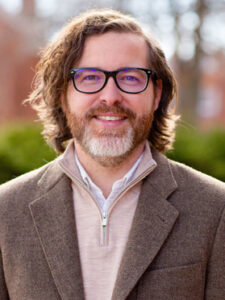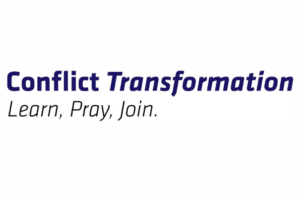Rev. Dr. Jacob Cook challenges church communities to accept conflict as an everyday part of living in community with other imperfect people and use it as a constructive force.
This blog is part of the ongoing Learn, Pray, Join: Climate Justice: Conflict Transformation series.
 Rev. Dr. Jacob Alan Cook is the assistant professor of Christian ethics at Eastern Mennonite Seminary and co-director for the Shalom Collaboratory. This program creates new theological formation spaces, to promote practices that make for just peace. Jake teaches courses and facilitates workshops around moral formation and discernment, adaptive leadership, and navigating tough conversations. He is the author of Worldview Theory, Whiteness, and the Future of Evangelical Faith (Fortress Academic, 2021) and several other book chapters and articles. Jake and his family participate in the life of Community Mennonite Church in Harrisonburg, Virginia.
Rev. Dr. Jacob Alan Cook is the assistant professor of Christian ethics at Eastern Mennonite Seminary and co-director for the Shalom Collaboratory. This program creates new theological formation spaces, to promote practices that make for just peace. Jake teaches courses and facilitates workshops around moral formation and discernment, adaptive leadership, and navigating tough conversations. He is the author of Worldview Theory, Whiteness, and the Future of Evangelical Faith (Fortress Academic, 2021) and several other book chapters and articles. Jake and his family participate in the life of Community Mennonite Church in Harrisonburg, Virginia.
_________________________________________________
Relationship, structure and skill are the three conditions for creative conflict, Kingian nonviolence practitioner Kazu Haga explains. And in his book, “Healing Resistance,” Haga argues that you need two out of three for a real chance at moving in a constructive direction.
For local churches, the relational condition for creative conflict may be the most abundant. What keeps people together, we might say, “despite their differences,” is a shared history with and appreciation for this community. And it’s relatively easy to imagine why, when the conversational waters get choppy with distress, unkindness and, especially, harm, a church-community might call upon outside professionals to bring their skills and deploy a structured process to help the relationships survive through conflict, and even thrive afterward.
Often enough, relationship is also the condition that prevents us from imagining conflict as a potentially constructive force. We might prefer “keeping the peace” to experimenting with skills for navigating conflict or testing conversations structured to help us better express our convictions or learn more about others’ beliefs and reasons.
Through the Shalom Collaboratory at Eastern Mennonite Seminary, I have been pursuing the question: Can church people work together in times of relative peace to develop the skills within themselves and their communities to see and seize on the creative potential of their everyday conflicts?
A new mindset: Conflict can be constructive
Practitioners, like Haga, have been trying to show us that conflict is a perfectly normal human experience. More than that, as ethicist Ellen Ott Marshall has convincingly argued, “Christians should be in conflict with one another, because the Christian faith is a dynamic, historical development.”
After decades of work in conflict prevention, then conflict management and resolution, many practitioners are endorsing a “conflict transformation” framework that affirms the everydayness of conflict and promotes the benefits of changing our mindsets and practices accordingly. I sense that our core definitions and concepts of community-building work begin to shift if we honestly account for the ordinariness, and even the normative value, of everyday conflict.
For one, accepting everyday conflict means the church community can be better imagined, in all its diversity, without seeking artificial forms of closure. So we might release the demand for uniform belief or practice as what holds people together and learn, instead, to appreciate our common calling to join an ever-widening circle of community — the boundaries of which are known by God alone. And in this community, one can count on a multiplicity of creative ideas, interpretations of any given problem and constructive responses to all the above.
If the flourishing of such a human community in and for the world is itself the goal, then how we practice life together to accomplish that goal should be consistent. The shalom — wholeness, integrity, peace — of these communities is not to be sought by getting everyone to hold all the same positions on every issue under the sun, thus preventing all moral conflicts. Rather, the peace of the community is lived into when everyone is invited and equipped to know and bring their full selves — to responsibly use their moral agency in this space among these people.
This deepening sense of personal responsibility is the shape of maturity, as we follow Jesus through real time and space.
Conflict transformation in church and world
We might participate in the development of shalom in our wider communities if and as we collaborate with our neighbors in ways that reflect these same means and ends. In other words, leadership in public spaces is of a piece with leadership in the church. It is not about rallying everyone behind our cause and holding all the same positions on every issue under the sun. Instead, faith-inspired public leadership invites and equips more and more people in our surrounding communities to know and bring their full selves to the shared work, to responsibly use their moral agency in this space, among and for these people.
In this season of heightened ideological difference and societal polarization, ways of thinking and behaving that are perfectly at home in our surrounding society are backflowing into church spaces. If theologically-curious folks could carve out some space to reflect on how to resist these patterns of thought and practice, they might find the Christian tradition carries helpful tales and tools. This is nowhere truer than in the concept of justice, which is at the heart of many of our moral conflicts.
What I gestured toward earlier as shalom-wholeness-peace is the animating principle and purpose of justice in the Bible. Take, for example, the Greek term “dikiaosune,” which is correctly translated into English as both “righteousness” and “justice.” Sometimes there’s a little too much righteousness and not quite enough as justice in English translations. Readers of these translations might fail to see these concepts’ interdependence. But both, understood biblically, denote a sense of moral integrity and wholeness for people and their communities.
If we are indeed a diverse and imperfect people, seeking healing and transformation within ourselves and our relationships, then we can anticipate troubles will emerge in the distribution of needed goods, in harmful transgressions of other and our environment. And if we are a people seeking shalom, then justice will look like restoring the integrity of individuals and communities. Seeking to make things right, we might ask: What needs to be done to restore the integrity of this community and its members?
A call to reflect and join
In a world of intense uncertainty and polarization, we should not really expect everyone — or anyone, really — to just have the frameworks, skill or will to seek an ever-expanding, all-including shalom. Where might we develop this sensibility or commitment?
If we are not willing to directly teach and deliberately practice conflict-aware, engaged shalom concepts in our church spaces, we can expect that nothingness to collapse into a vacuum that pulls solutions and frameworks from other ways of thinking in to fill the void. That is what has already happened in all too many church communities, and that is how we end up with churches that do not look very much like Jesus.
If we are to be positively formed for the everyday work of transforming conflicts, if there is to be an image of shalom-wholeness-peace on earth, then let it begin with us and our church communities. With a sense that conflicts can be constructive in the pursuit of deeper relationships of greater integrity, within a framework that can address transgressions and heal harms, we can do this work together. Engaging the resources across this “Learn, Pray, Join” initiative would be a great start.

“Learn, Pray, Join: Conflict Transformation” provides tools and resources to help MC USA church communities peacefully engage in dialog around difficult and divisive topics. By embracing restorative justice and modeling healthy communication, we seek to witness to God’s peace, as we build diverse communities to serve and follow Jesus.
You are invited to get involved with Learn, Pray, Join: Climate Justice: Conflict Transformation.
Support Mennonite Church USA’s Peace and Justice Initiatives by giving here.
The views and opinions expressed in this blog belong to the author and are not intended to represent the views of the MC USA Executive Board or staff.
Interested in submitting a blog for Menno Snapshots? Please see our blog guidelines here.

